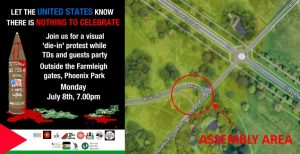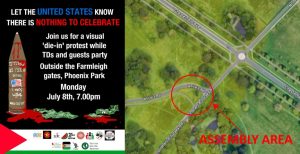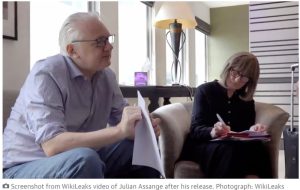Lola Hynes – Irish Anti War Movement
Lola Hynes – Irish Anti War Movement
A diplomatic, military and economic stranglehold
is currently being placed on the Islamic Republic of
Iran. With unsettling echoes of the lead up to the war
on Iraq in 2003, unsubstantiated claims have been
made that Iran is covering up a nuclear weapons
programme. The charges of possession of weapons of
mass destruction against Iraq were similarly unproven,
yet the invasion and occupation lead to the death of
over a million people by some estimates. There is grave
danger looming of a repeat of this catastrophe. The US,
prodded by Israel are bullying and intimidating Iran with
the use of sanctions and the threat of force if Iran does
not suspend its legitimate nuclear energy programme.
Not a shred of evidence has been found to show that
Iran is developing a nuclear weapons programme.
Iran was one of the first countries to sign the Nuclear
Non-Proliferation Treaty (NPT) in 1968 in order to
prevent ‘’the spread of nuclear weapons and weapons
technology’’ and ‘’to promote co – operation in the
peaceful uses of nuclear energy’’. Under the terms of
this treaty Iran has the right to develop nuclear energy
for peaceful purposes, it also has the right to access
help from other members of the NPT. Western pressure
has blocked access to this co–operation forcing
Iran to become self-reliant in nuclear technology.
Iran is legally developing nuclear technology for
domestic energy and medical purposes. The US
congress has charged that, because Iran is an oil rich
country, it does not need nuclear energy. However, with
a population of 70 million, which has doubled over the
last thirty years, Iran’s energy needs are growing. There
are approximately 800,000 cancer patients in need of
therapy involving radioactive isotopes which are close
to running out. Crippling and illegal sanctions are
preventing Iran from obtaining raw goods for oil refining
thus adding to its need to develop alternative energy
sources. Furthermore why should Iran have to justify
the production of nuclear energy when international
law permits them to do so? Why should it be one law for
Iran and another for the US, Britain, France, Israel etc.?
Nuclear energy and Nuclear weapons both require the
enrichment of Uranium. However, for domestic energy
purposes the enrichment process is up to 5% (for
medical purposes it is up to 20%) but for atomic weapons
it must be enriched to a very high degree, around 90%.
According to Dr Frank Barnaby of the Oxford Research
Group, because of contamination of Iranian uranium
with heavy metals, Iran cannot possibly enrich beyond
even 20% without support from Russia or China.
Iran voluntarily suspended the enrichment of
Uranium in 2003 in order to boost confidence in its
nuclear programme. It also voluntarily implemented
an additional protocol initiated by the International
Atomic Energy Agency (the UN’s nuclear watchdog)
which allowed even more intrusive inspections then
those required under the guidelines of the NTP. Despite
this co-operation and transparency, with pressure
from the US, Iran’s nuclear file was referred to the UN
Security Council in 2006. There were no legal grounds
for such a move as there has never been any evidence
of a nuclear weapons programme and Iran has always
cooperated with the IAEA within the framework of the
NPT. Subsequent to its referral to the UN, Iran withdrew
from the additional (voluntary) protocol but has
offered to reinstate it once their file has been returned.
Every report to date from the IAEA has confirmed the non
diversion of enriched Uranium into a nuclear weapons
programme. However, Iran’s legitimate withdrawal from
the optional additional protocol has been used to single
them out. The IAEA made the following statement in
their November 2011 report ‘’Iran has not provided the
necessary cooperation to permit the Agency to confirm
that all nuclear material in Iran is in peaceful activities’’.
Despite the context of this being distorted by the media
it is not evidence of nuclear militarization, nor do they
mention the dozens of other NPT members who have
not agreed to the optional NPT Additional Protocol
to allow extra-intrusive inspections. This ‘necessary
co – operation’ is not compulsory for any other county.
The insistence of the US that Iran must suspend
all Uranium enrichment before it will negotiate
is unreasonable and unlawful. In 2005 the IAEA
demanded that Iran permanently forfeit its right to
enrichment despite the Director General Dr Mohamad
El Baradei consistently confirming the non diversion
to weaponisation. In an interview with the New York
times in 2007 El Baradei asserted ‘’ we have not come
to see any undeclared activities, we have not seen
any weaponistaion of their programme, nor have we
received any information to this effect’’, he also later
noted in a speech to the governor’s board of the IAEA
that 45 other countries are in the same category as
Iran and have not adhered to the additional protocol.
US Miltary bases in the region
The double standards in relation to the UN resolutions
against Iran are very apparent when compared to
the US and its allies. Israel, who has not signed the
NPT, has developed an arsenal of nuclear weapons
and does not allow IAEA inspections. In 2000, South
Korea enriched 200 milligrams of uranium to nearweapons
grade (up to 77%), but was not referred to
the UN Security Council. India and Pakistan are also
non signatories of the NPT but have developed nuclear
weapons. And of course the US itself has spent $7
trillion on nuclear weapons to date and is the only
country to have ever used nuclear weapons in war.
There is a long history of the West interfering in Iran
and wrestling for power over the Iranian oil industry.
In 1913 the British gained control through the Anglo
Persian Oil Company (later British Petroleum BP). In
1951 Prime Minister Mosaddegh nationalized the oil
and formed the National Iranian oil company as part
of a series of social reforms. In 1953 a coup organised
by the CIA and MI6 deposed Mosaddegh and installed
the Shah of Iran, who conveniently allowed the oil
company to revert to control by the West. The 1979
revolution which established the Islamic Republic of
Iran and overthrew the Shah saw the National Iranian oil
company fall back into the full control of Iran. The US has
pursued a policy of sanctions and aggression ever since.
Iran has not attacked another country in over 250
years. It was one of the first countries to sign the
NPT, has met all its obligations under the NPT, has
voluntarily accepted additional inspections between
2003 and 2006 and even suspended enrichment in
2003. Iran was in full support of the Tehran agreement
brokered by Brazil and Turkey, which could have
seen a peaceful resolution to the Iranian nuclear
issue. The US government caused these negotiations
to break down. Iran’s supreme leader Ayatollah
Khemenei has asserted that Iran will not attack or
threaten any other country and he has banned nuclear
weapons as Haraam (forbidden under Islamic law).
The nature of concern by the US in Iran’s nuclear affairs
is questionable at best. Danielle Plekta, Vice President
of the foreign and defense policy of the American
Enterprise Institute commented in 2011 ‘’The biggest
problem for the United States is not Iran getting a
nuclear weapon and testing it, it’s Iran getting a nuclear
weapon and not using it.’’ Iran would then have to be
viewed as a ‘’Responsible power’’ and the ultimate
goal of regime change to ensure Western hegemony
in the region would be much harder to justify. The
current regime in Iran has an appalling human rights
record, however there is no evidence that a Western
friendly leader would fare any better, the Shah of
Iran, installed by the US and Britain in 1953 was
responsible for the execution and torture of thousands.
An attack on Iran will have catastrophic consequences
and will lead to the loss of thousands of lives. It will
provoke retaliation and deepen the divide between
Muslims and the west. It will promote terrorism and
fan the flames of Islamophobia. It could start a full scale
regional war in the Middle East and a nuclear arms race.
In order to find a peaceful resolution to this western
imposed crisis President Obama should honour his
election promises and move away from confrontation
and toward ‘direct and unconditional negotiations’. The
policy of sanctions and threats must be abandoned
and replaced with one of diplomacy and dialogue.






